Unveiling Van Running Costs and How to Optimise Them
Your Complete Guide to Understanding and Reducing Van Operating Expenses
Buying a van is one thing, but have you ever considered how much it really costs to run a commercial vehicle day in and day out? Smart financial planning is the key to running a successful business - and your daily drive is a big part of that.
To help you understand the true cost of van ownership, we’ve created a comprehensive guide unveiling van running costs and how to optimise them. In this article, we'll highlight every expense you need to consider and share our expert tips on how to keep those costs under control.
Key Takeaways:
- Monthly van running costs typically range from £400 to £800 depending on your usage and the type of van you drive.
- Filling your van with fuel is the largest ongoing expense, accounting for 30-40% of running costs throughout the year.
- While van servicing is a cost, regular maintenance of your vehicle can significantly reduce unexpected repair expenses further down the road.
- Compared to petrol and diesel vans, electric vans have higher upfront costs but lower running expenses overall.
- Don’t forget that various finance options are available to spread the initial cost of your van.
- Planning your routes more efficiently and adapting your driving style can reduce total running costs by up to 20%!
Van Finance and Purchase Costs
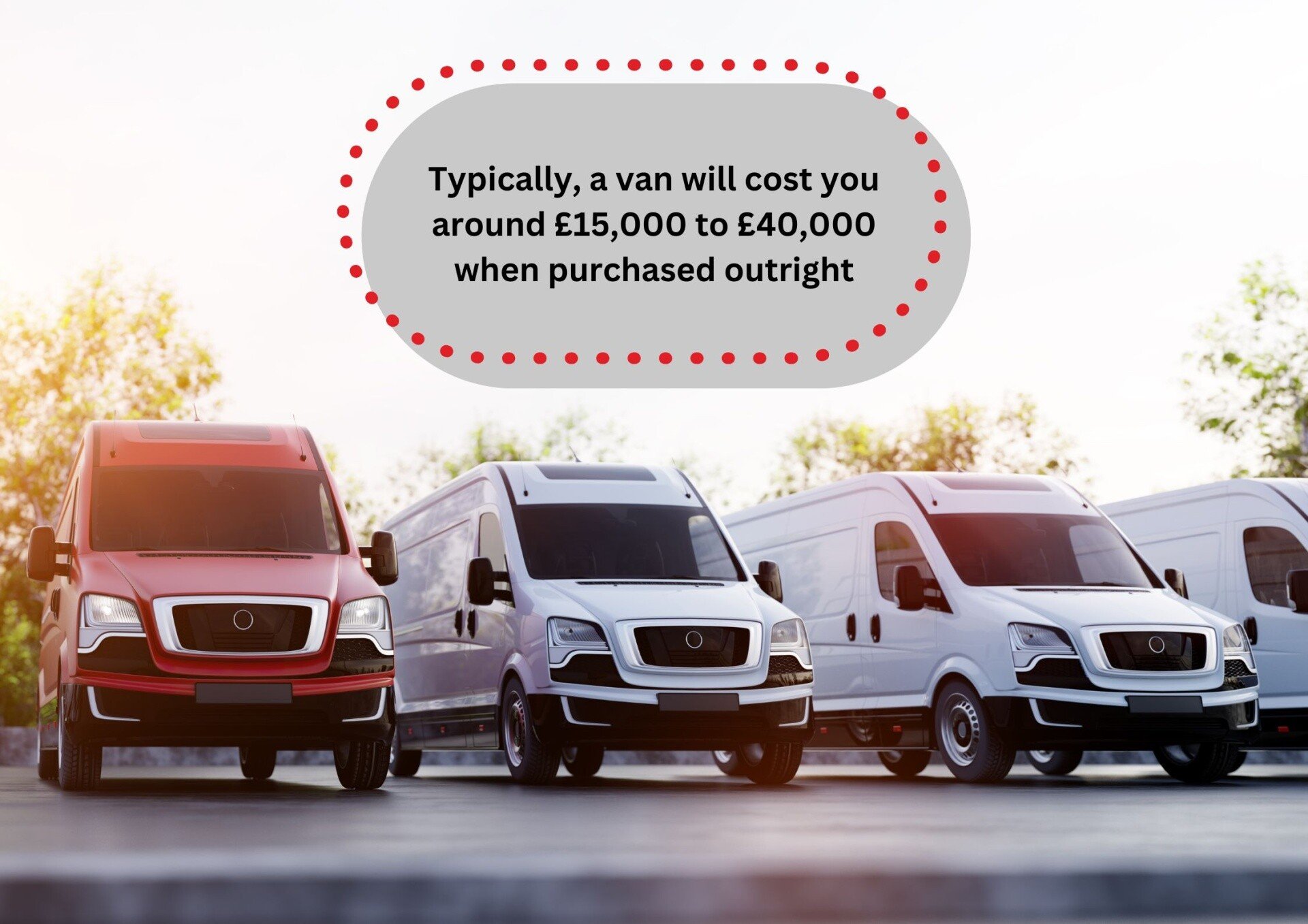
First things first then, let’s talk money and how to get your hands on that ideal van without breaking the bank! The good news is that there are plenty of options available to you. Much like taking out a mobile phone contract, you can either pay upfront if you happen to have the cash or spread the cost if that works best for your pocket.
***Read all there is to know about the different methods of Van Finance here.
So how much can you expect to pay? Well, purchasing a van outright will set you back anywhere from £15,000 to £40,000 for a new van, which, let's face it, is a pretty hefty sum. That’s why financing a van is becoming a very popular choice. By comparison, vehicle finance agreements can bring the cost down to manageable monthly payments of around £200 to £500, depending on the make and model.
Leasing is another popular option (see all our van lease deals here) - particularly for businesses - with costs typically ranging from £250 to £600 a month. Think of it as renting on a long-term basis. This means you get all the benefits of a new van without the commitment of full ownership. Just keep in mind that with finance, a final balloon payment might be lurking at the end of your agreement if you want to eventually own the van, so always understand what you’re signing up for first!
Then there’s a deposit to think about. Most finance companies will expect you to pay between 10% to 20% upfront first. So, if you're eyeing up a £20,000 van, that means having at least £2,000 to £4,000 available for the deposit. It might seem like a lot, but a bigger upfront payment will mean your monthly repayment to the lender is lower.
A Snapshot Look at Initial Van Costs:
- An outright purchase will typically cost you around £15,000 to £40,000 for a new van.
- Monthly payments for van finance are usually between £200 to £500.
- A deposit of between 10% to 20% of the van’s vehicle’s value is usually required.
- Leasing a van will likely cost you around £250 to £600 per month.
Van Insurance
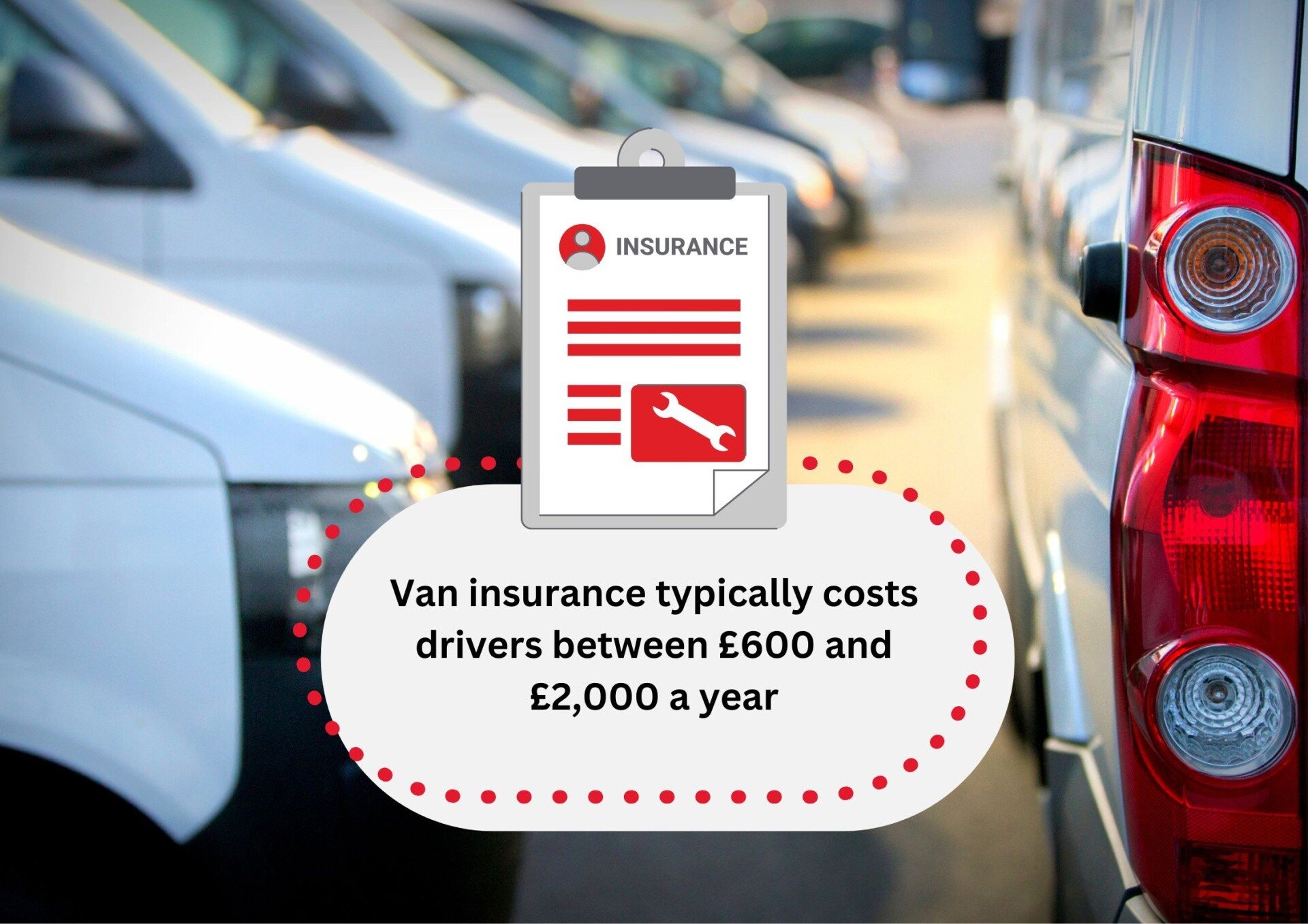
If you want to drive a van in the UK, then of course you’ll need the appropriate vehicle insurance. As for how much it will cost, would you believe that age alone can make hundreds of pounds of difference to your annual premium? For example, a 25-year-old driver might pay double what a 45-year-old pays for the exact same van!
Annual van insurance premiums typically fall between £600 and £2,000, but there's more factors that can affect this cost which may reduce or increase it. The premium offered is a result of your age, driving history, where you park at night, and what you're using the van for. Any previous driving convictions will also play a part.
Our top tip: One tip that could save you money is to install a simple alarm system or immobiliser. And if you're really clever about it, combining security upgrades with a higher voluntary excess could save you hundreds of pounds each year. Just make sure that the excess you choose to pay is something you can actually afford if the worst should happen!
Considerations for Van Insurance:
- Annual insurance premiums typically range from £600 to £2,000.
- Factors affecting the price you pay include:
- Driver age and experience
- Van value and type
- Business use vs personal use
- Parking location
- Claims history
- Ways to reduce your premium include:
1. Installing security devices
2. Increasing your excess
3. Building a no-claims bonus
4. Comparing multiple quotes
How to Save on Your Insurance Premium:
- Shop around for a new deal EVERY year (loyalty doesn't pay these days!).
- Increase your voluntary excess (but keep it affordable).
- Park in a secure location overnight (your driveway is better than the street).
- Pay annually if you can (monthly payments often come with hidden interest).
Van Road Tax (Vehicle Excise Duty)
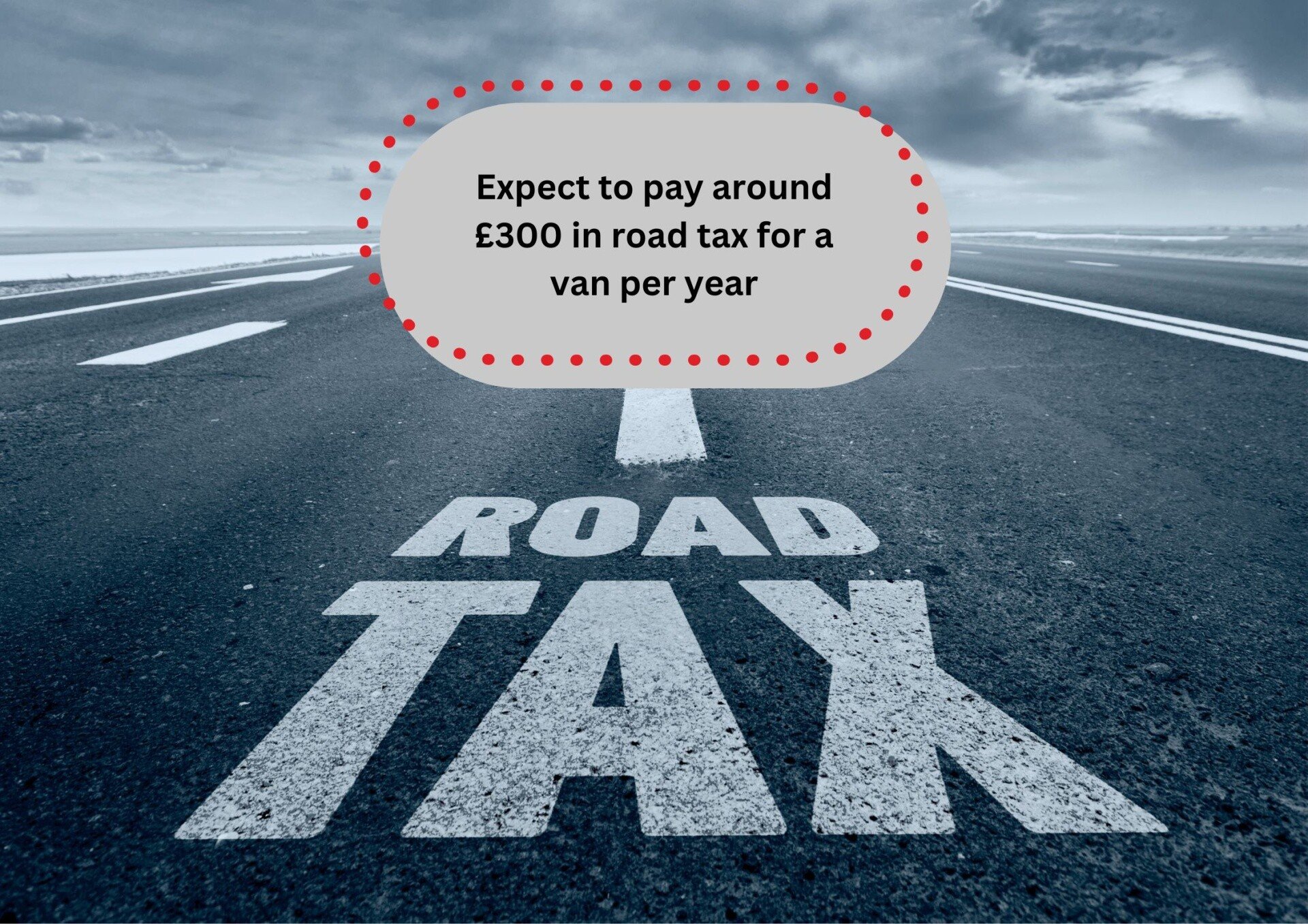
Road tax might on the surface seem straightforward, but the prices can vary ever so slightly. Vehicle Tax Rates for LCVs (Light Commercial Vehicles) are set at £335 for 12 months if you drive a petrol or diesel model. If you choose to pay the fee in instalments, the price increases to £351.75. However, if you choose to go electric, you'll currently pay absolutely nothing which is the perk of driving a zero-emission van.
***Read all you need to know about van tax in our dedicated guide here.
The tax rate depends entirely on when your van was registered, how much CO2 it pumps out, and how heavy in weight it is. Knowing the rules can help you make smarter choices when choosing your next van and potentially help you save hundreds of pounds.
Van Servicing, MOT, and Maintenance
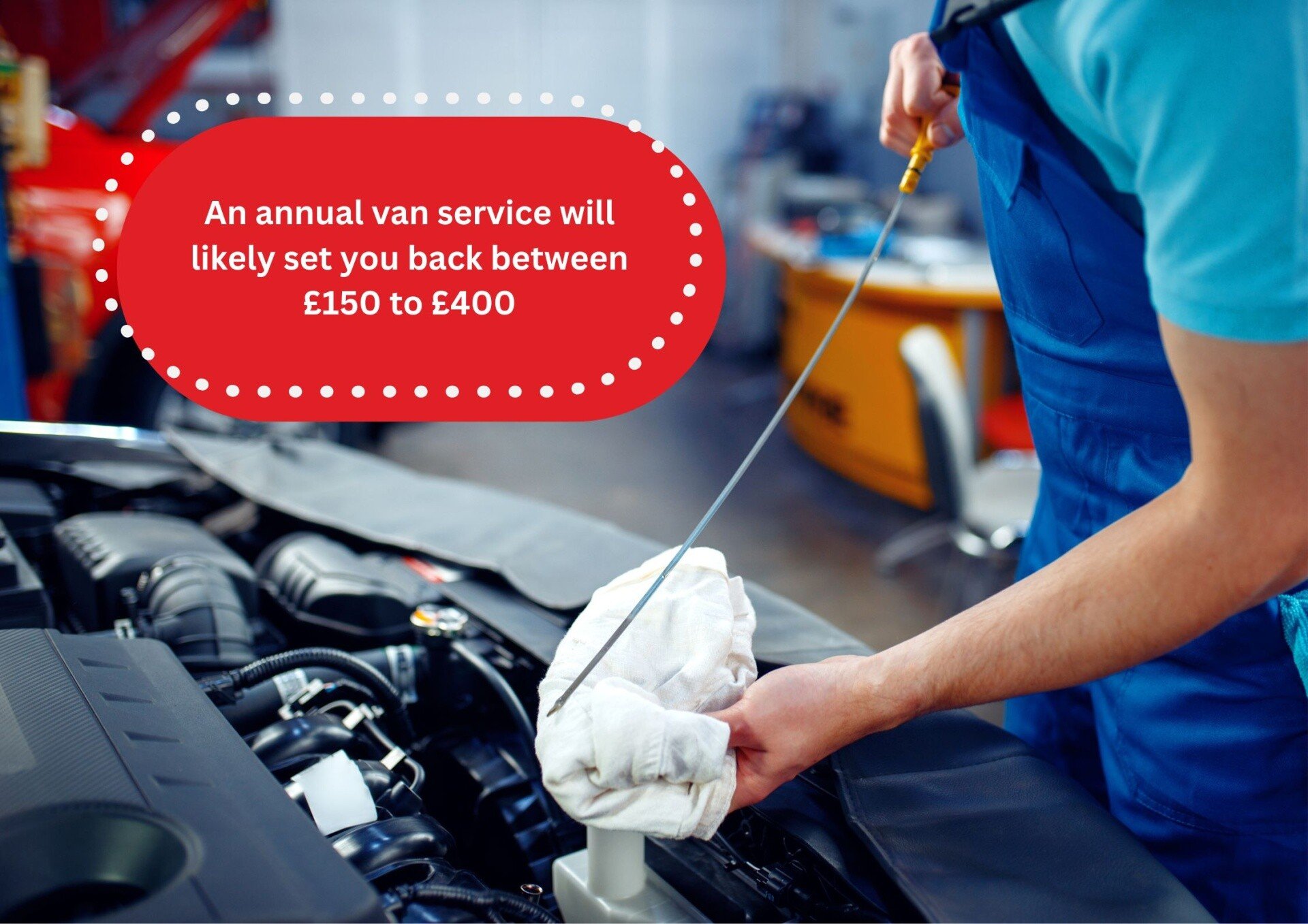
To keep your van running in peak condition, it needs regular check-ups and care to perform at its best. Skipping services might seem like an instant money-saver, but trust us, it's like ignoring a toothache – it'll only cost you more in the long run!
An annual van service typically costs between £150 to £400, depending on your van's make and model. Be aware that some types of vans require specialist attention and expensive parts, while others are simpler and more straightforward to maintain, which is reflected in the cost. We always recommend you do your research before deciding which model to choose.
Common Van Maintenance Costs:
- Tyres can cost between £70 to £100 each.
- Brake pads are typically £100 to £200 and will cost more if you need discs replaced too.
- A standard battery replacement will set you back at least £100 to £180 (though these prices keep creeping up!).
- A new timing belt will cost around £200 to £500.
We appreciate it’s easier said than done, but setting aside around £50 a month for a maintenance fund could prove dividends if and when your van needs some TLC. And let’s not forget the annual MOT expense if your van is over three years old. Currently, a standard MOT test costs a maximum price of £58.60 for a van weighing up to 3,500kg. However, this price could rise throughout the course of 2025.
Maintenance Tips and Tricks:
- Learn basic maintenance yourself (YouTube is your friend here!).
- Address small issues before they become big problems (that funny noise won't fix itself!).
- Use independent garages for older vans (main dealers aren't always worth the extra cost).
- Build a relationship with a trusted mechanic (they might throw in some free health checks).
- Keep your service history up to date (it's worth gold when you come to sell).
Fuel or Charging Costs for a Van
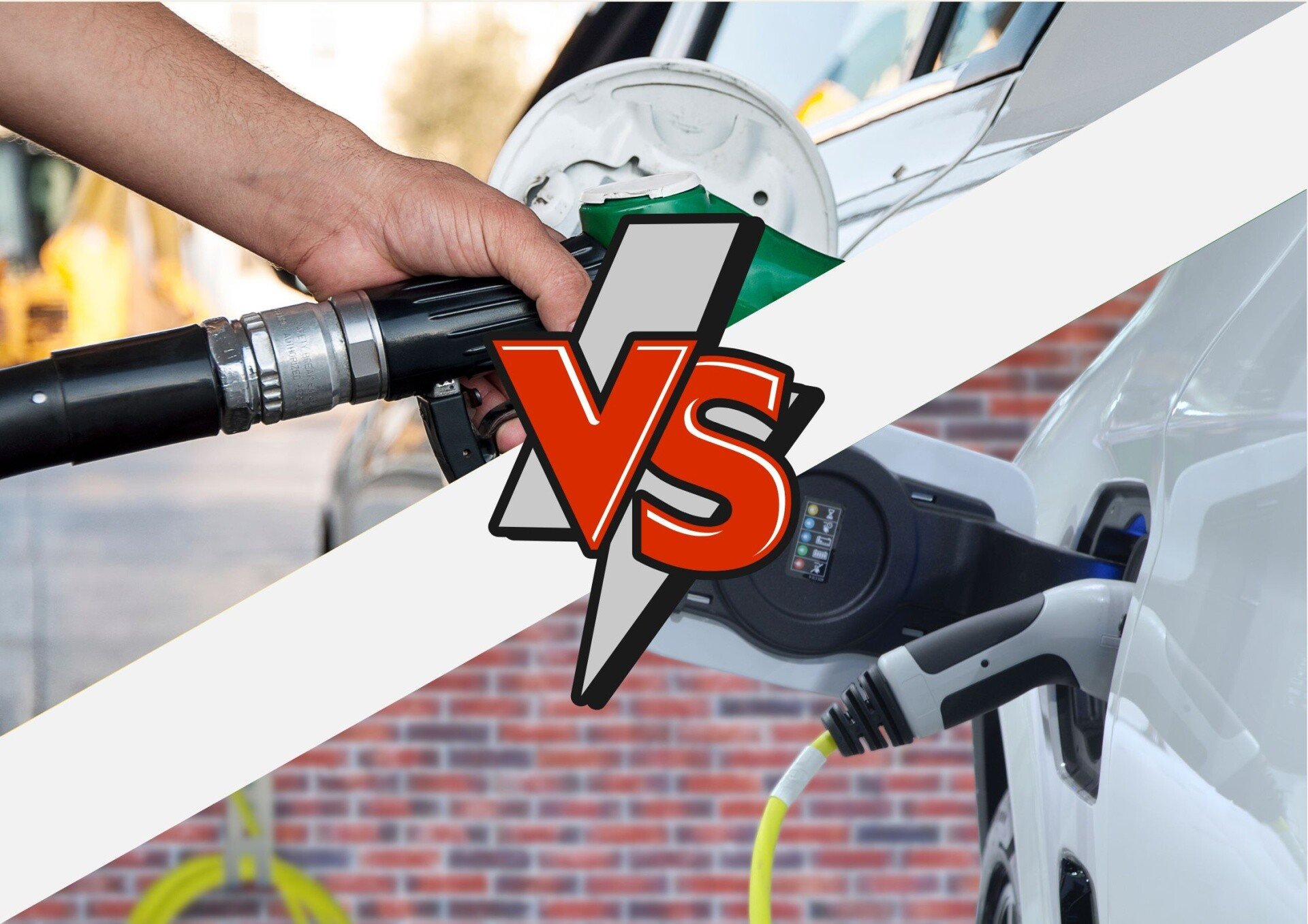
When it comes to putting fuel in your vehicle, this is where your choice of van can have a more positive effect or negative impact on your wallet. To help give you a better idea of how much it will cost to fuel your van, we’ve provided the hypothetical example below:
Imagine you're driving 20,000 miles a year (which is pretty typical mileage for a working van). With a diesel van, you're looking at paying around 12p to 15p per mile, which adds up to between £2,400 to £3,000 annually; that's like buying 1,000 cups of coffee – quite an eye-opener, isn't it?
Petrol vans are even thirstier to run, gulping down an average of 15p to 18p per mile, totalling around £3,000 to £3,600 per year. So how does this stack up against a battery-powered model? Well, by comparison, an electric van costs around 3p to 6p per mile. That's a massive saving of up to £2,400 per year! This means you could actually buy those 1,000 cups of coffee with the money you've saved!
The real game-changer though is home charging versus public charging. If you were to plug your van in at home overnight, and you're paying domestic electricity rates, then you can expect to pay around 34p per kWh. If you choose to top-up when on the road during the day by using a rapid charger, then you could be paying up to 70p per kWh. Think of it like the difference between cooking at home and eating out at a restaurant - it’s fine occasionally, but you wouldn't want to do it daily!
***Click here to find out which are the best MPG vans of this year!
A Snapshot Look at Fuel and Charging Costs:
- Diesel vans cost on average 12p to 15p per mile - based on 20,000 miles a year = £2,400 up to £3,000 in annual fuel costs.
- Petrol vans cost on average 15p to 18p per mile - based on 20,000 miles a year = £3,000 up to £3,600 in annual fuel costs.
- Electric vans cost on average 3p to 6p per mile - based on 20,000 miles a year = £600 up to £1,200 in annual charging costs using a standard home charging unit.
How to Reduce Your Van’s Fuel Consumption:
- Go easy on the accelerator! Smooth driving can save you up to 15% on fuel.
- Use your van’s cruise control feature on motorways – it's like having a fuel-efficiency expert at the wheel.
- Lowering your speed, dropping from 75mph to 65mph, could save you 15% on fuel costs in a year.
Additional Road Charges for Vans
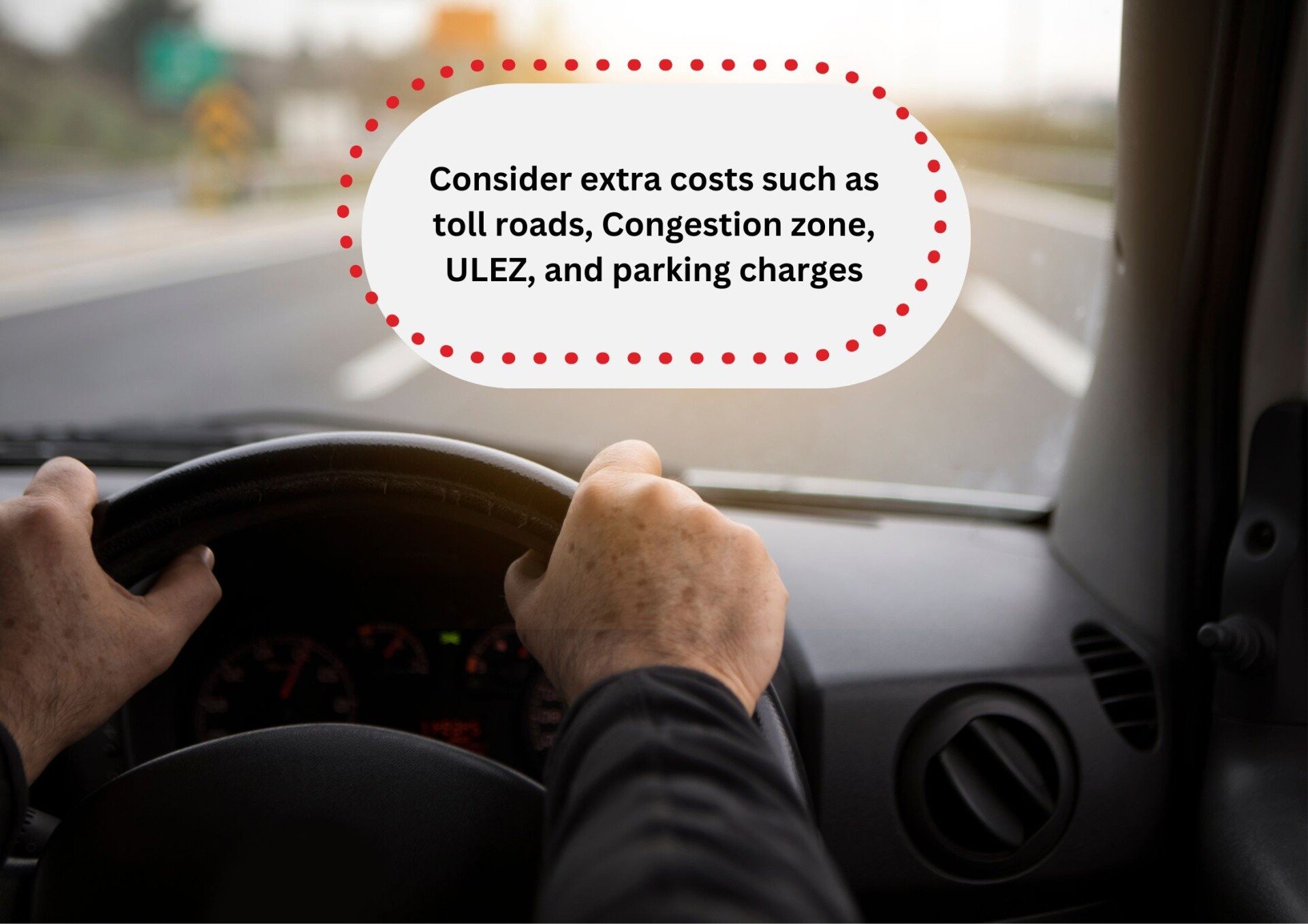
While we’ve covered most of the major costs for running a van each year, there are some minor costs to consider that can really add up if you don’t keep track of them. For instance, if you drive in London, then you’ll need to factor in the London Congestion Charge at £15 per day. Then there’s the ULEZ (Ultra Low Emission Zone) charge of £12.50, so you're looking at £27.50 just to drive through central London for one day!
Clean Air Zones are popping up faster than coffee shops these days, with more cities joining the party every year. The likes of Birmingham, Bristol, and Bath have each got their own rules and rates. So it’s always worth bearing in mind these costs when your work takes you to any of the major cities across the UK.
And let's not forget those toll roads and bridges. The Dartford Crossing might only be £2.50 for a van, but cross it twice a day for work, and that's a whopping £1,250 a year! It's worth getting familiar with these costs and building them into your pricing if you're running a business.
Consider These Extra Road Costs:
- London Congestion Charge is £15 per day.
- London’s Ultra Low Emission Zone (ULEZ) is £12.50 per day.
- Clean Air Zones (CAZ) charges can vary by city.
- Toll road rates can vary by route.
- The Dartford Crossing charge (Dart Charge) is £2.50 for a van per trip.
- Costs for parking permits and associated charges.
Our top tip: If you’re looking to reduce these costs then consider signing up for an account or if you’re a local resident, then make sure to claim any discounts available. For example, if you live near the Dartford Crossing, you’ll only need to pay £20 a year to use the bridge and tunnel as many times as you want within the 12-month period. If you regularly access the crossing but aren’t a local resident, then having an account will save you 50p per trip, which can really add up over time.
Also, remember that in time, your van will start depreciating. Read how you can minimise that in our van depreciation rates article here!
Van Running Costs Conclusion
So there you have it – our complete rundown on annual van running costs! The key to managing your vehicle expenses is to treat the running costs like managing all your household bills.
When investing in a new or used van, here's our final piece of advice: make sure to take some time to crunch your own numbers. Grab a cuppa, sit down with a calculator (or spreadsheet if you're feeling fancy!), and work out what matters most for your situation. Is fuel efficiency your biggest concern? Or are those annoying London charges more of an issue? Once you know your pain points, you can start tackling them one by one and making cutbacks if needed.
Remember, the cheapest option isn't always the most cost-effective one in the long run. We recommend you focus on the total cost of van ownership rather than just calculating the initial expenses and regularly review your running costs to identify areas for potential savings.
FAQs and Answers:
Q: How much does it cost to run a van per month?
A: The average monthly cost of running a van typically ranges from £400 to £800, depending on your usage. Here's a rough monthly breakdown:
- Finance Payment (if applicable): £200 to £500
- Fuel Costs: £150 to £300 (depending on mileage)
- Insurance: £50 to £170
- Road Tax: £24 to £27
- Maintenance Fund: £50
Q: What's the cheapest van to run?
A: Electric vans are currently the cheapest to run in terms of fuel and tax costs, with running costs as low as 3p per mile. However, this isn’t necessarily the case when it comes to the initial purchase price. In this instance, smaller diesel vans like the Citroen Berlingo, Peugeot Partner and Ford Transit Connect tend to offer the best balance of purchase price and running costs.
Q: How much should I budget for van maintenance?
A: A good rule of thumb is to set aside between £500 to £1,000 per year for vehicle maintenance. Consider the following requirements:
- Annual service: £150 to £400
- MOT: £58.60
- Tyres: £280 to £400 per set
- Emergency repairs: allow £200 to £500
Q: Is a van expensive to insure?
A: Van insurance can cost anywhere from £600 to £2,000 annually, but it varies hugely based on your age and experience, the van's value and size, your business use, where you park overnight, and your claims history.
Q: Are electric vans worth the money?
A: The short answer? Well, it depends on your usage, but increasingly, yes! We recommend them because running costs are 60-70% lower than diesel equivalents, you’ll pay no road tax (for now, anyway), there are no emission zone charges, you can expect lower maintenance costs, and there are also Government grants available.
Q: How can I reduce my van running costs?
A: Here are some proven ways to keep costs down:
- Drive efficiently (this can save you 10 to 15% on fuel)
- Regular maintenance prevents costly repairs
- Shop around for insurance annually
- Plan routes to avoid toll roads and charges
- Keep tyres properly inflated
- Remove excess weight
- Compare fuel prices using apps
Q: Do I need special insurance for business use?
A: Yes, you'll need commercial van insurance if you use your van for commuting to different locations, carrying tools or goods, as well as any business activities. Typically, personal van insurance won’t cover any goods you’re carrying, your tools and equipment, or business liability.
***Click here to read our article "Are Van Prices Dropping in 2025?"
Start Your Van Journey with Loads of Vans
Are you ready to take the next step? We know choosing a van isn't just about picking a vehicle – it's about finding a trusted partner who'll help you make the right choice for your needs and budget. That's where we come in!
Why Choose Loads of Vans?
Here at Loads of Vans, we're a bit different from your typical van dealer. Think of us more like your van-finding friends who happen to be experts in the field! We've been helping drivers find their perfect match for years, and we love nothing more than seeing a customer drive away with exactly what they need (and usually a big smile on their face).
We'll help you crunch the numbers, weigh up the options, and find something that fits your budget like a glove. Come in and see us and we’ll get the kettle on! In the meantime, you can search through our commercial vehicle stock right here on our website.


